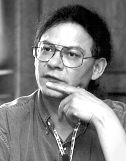Gil Cardinal
Indspire > Events > Indspire Awards > Laureates > Gil Cardinal
Gil Cardinal
Arts (1997)
It took a movie for Gil Cardinal to become aware of his Aboriginal heritage – a movie he himself was destined to make. Growing up in Edmonton, the award winning director, producer and film-maker knew very well he was an Aboriginal foster child, and felt isolated. Attending school he became more and more withdrawn and began to cut classes. Finally, the last in a series of social workers intervened. She encouraged him to attend the Northern Alberta Institute of Technology where he found his calling in the radio and television arts program. His career took off. In the early 1970s, he worked as a cameraman. From there, he made his first documentary, a portrait of pianist Mark Jablonski. A producer liked what he saw and offered Cardinal the job directing the series Come Alive. By 1980, Cardinal was freelancing for the National Film Board and his subjects touched on Aboriginal concerns. There was Children of Alcohol, a documentary about kids from alcoholic families, and another on Aboriginal spirituality in prisons. In the 1980s, he made Foster Child, the powerful story of his discovery and contact with his birth family. Cardinal was both director and subject. A Gemini Award for Best Director for Foster Child followed. But this wasn’t the most important result. Instead, it sparked his Aboriginal self-discovery. In the years since, his works, dominated by Aboriginal themes and issues, have been showcased at numerous international festivals; he has directed episodes of North of 60 and he has worked with the BBC, CBC and Atlantis Films. Doing so has greatly increased Aboriginal awareness across the cultural spectrum. Gil Cardinal received a 1997 National Aboriginal Achievement Award for using his lens to capture the Aboriginal world on film.







